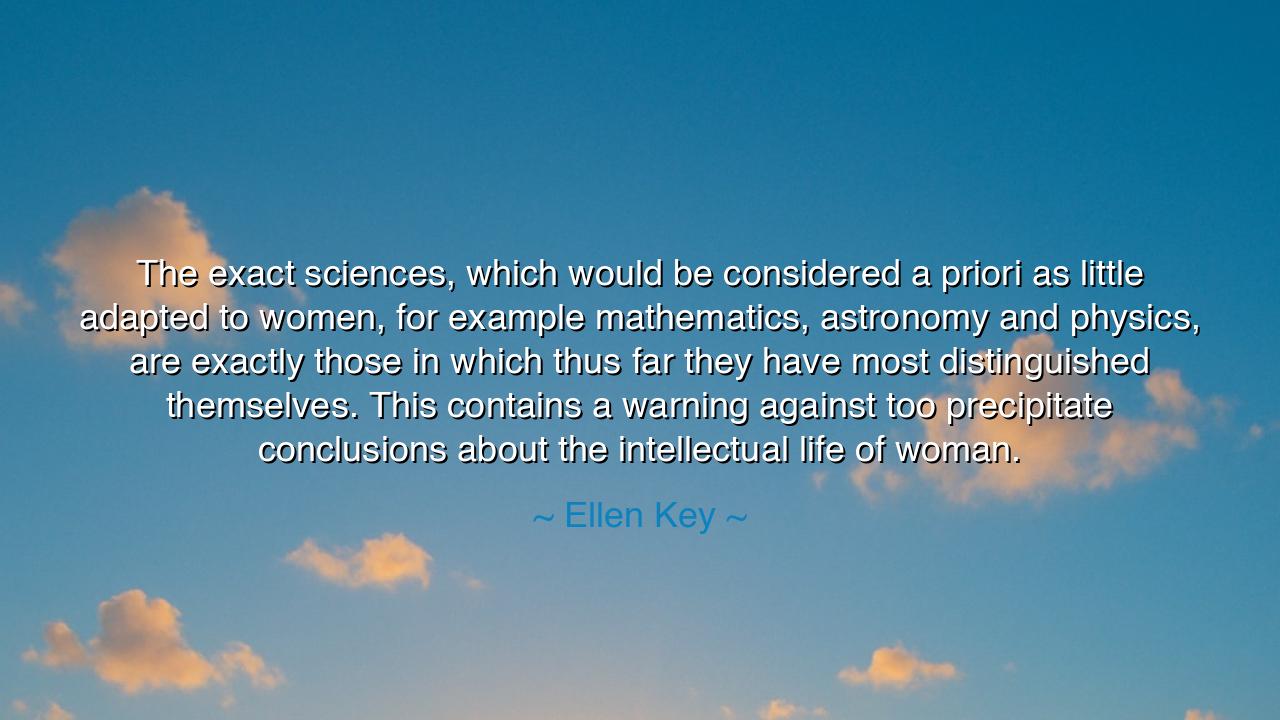
The exact sciences, which would be considered a priori as little
The exact sciences, which would be considered a priori as little adapted to women, for example mathematics, astronomy and physics, are exactly those in which thus far they have most distinguished themselves. This contains a warning against too precipitate conclusions about the intellectual life of woman.






The words of Ellen Key — “The exact sciences, which would be considered a priori as little adapted to women… are exactly those in which thus far they have most distinguished themselves” — thunder like a challenge hurled against the prejudice of ages. She declares that the realms of mathematics, astronomy, and physics — long thought the cold and distant towers of the mind, accessible only to men — have been crowned by the triumphs of women. And thus, she warns the world: let no one judge the intellectual life of woman with haste, for history has already proved such judgments false.
For centuries, it was whispered that the feminine spirit was too delicate, too bound to emotion, to thrive in the rigid structures of the exact sciences. Yet again and again, women entered these forbidden halls and left their mark of brilliance. Ellen Key, with prophetic vision, calls us to see that this is no accident but a rebuke — a living contradiction of narrow beliefs. The truth she proclaims is eternal: the mind knows no gender, only strength, patience, and clarity of thought.
Consider the story of Hypatia of Alexandria, who in the ancient world rose as a philosopher, astronomer, and mathematician, teaching men who traveled from afar to sit at her feet. In her, the lie of women’s weakness was shattered; her wisdom shone like a beacon in the dark ages of ignorance. Centuries later, Marie Curie would carry that torch further, unraveling the mysteries of radioactivity and becoming the first to win Nobel Prizes in two sciences. Both women embodied the truth of Ellen Key’s words: that where exclusion was preached, achievement was born.
The warning Key offers is more than a historical note — it is counsel for the future. Those who too quickly decree what a woman cannot do, what her mind cannot master, will soon find themselves humbled. The spirit of discovery answers not to prejudice but to passion, and wherever passion burns, genius may arise. To stifle half of humanity with doubt is to rob the world of its greatest treasures.
Therefore, O seekers of truth, carve this lesson into your hearts: never make precipitate conclusions about the power of the human soul, least of all when it concerns women. For as Ellen Key reminds us, the very places where the world thought they would falter are the places they have most excelled. The triumph of women in the exact sciences is not only their victory, but a rebuke to all who doubted them — and a herald of the unmeasured greatness yet to come.






UTUyn To
This quote makes me think about the ways in which society has historically underestimated women’s intellectual abilities. It's so easy to make assumptions about a person's potential based on outdated ideas, but how do we truly measure someone's capabilities? Can we really say that fields like physics are ‘better suited’ for one gender over another? How do we overcome these societal assumptions and create a more equitable and inclusive environment in the sciences?
LDdang chau hoai lin DI
Ellen Key’s perspective challenges the stereotypes that limit women’s potential in intellectual fields. But I’m curious about how much these gender biases still persist today. Are women truly given the same opportunities in STEM fields as their male counterparts, or do subtle barriers still exist? It’s clear that women have proven their intellectual capabilities, but are we doing enough to encourage and support them in these disciplines in the present day?
VPNguyen Van Phong
It’s empowering to think about how women have excelled in fields like math, astronomy, and physics, despite being historically underestimated. But I also wonder if women’s success in these areas is often overshadowed by the dominance of men in the sciences. Could it be that women’s contributions are still not as celebrated as they should be? How can we shift the narrative to ensure these achievements are more widely recognized?
DTThu De Thuong
This quote resonates with me, especially when I think about how many women have been pioneers in science, yet their achievements are often overlooked. It’s fascinating that these ‘exact sciences,’ often seen as beyond women’s capabilities, are actually the very fields where women have proven themselves most. What does that say about our assumptions and biases? Shouldn’t we be more focused on encouraging everyone to pursue their intellectual passions, regardless of gender?
LLLinhh Lyn
I find this quote to be quite striking. It challenges the outdated notion that women are inherently less suited for fields like mathematics or physics. I wonder, though, how many opportunities were denied to women in these fields throughout history, simply because of these misconceptions. How much untapped potential was there that we’ll never know about, just because women weren’t encouraged to pursue those disciplines?